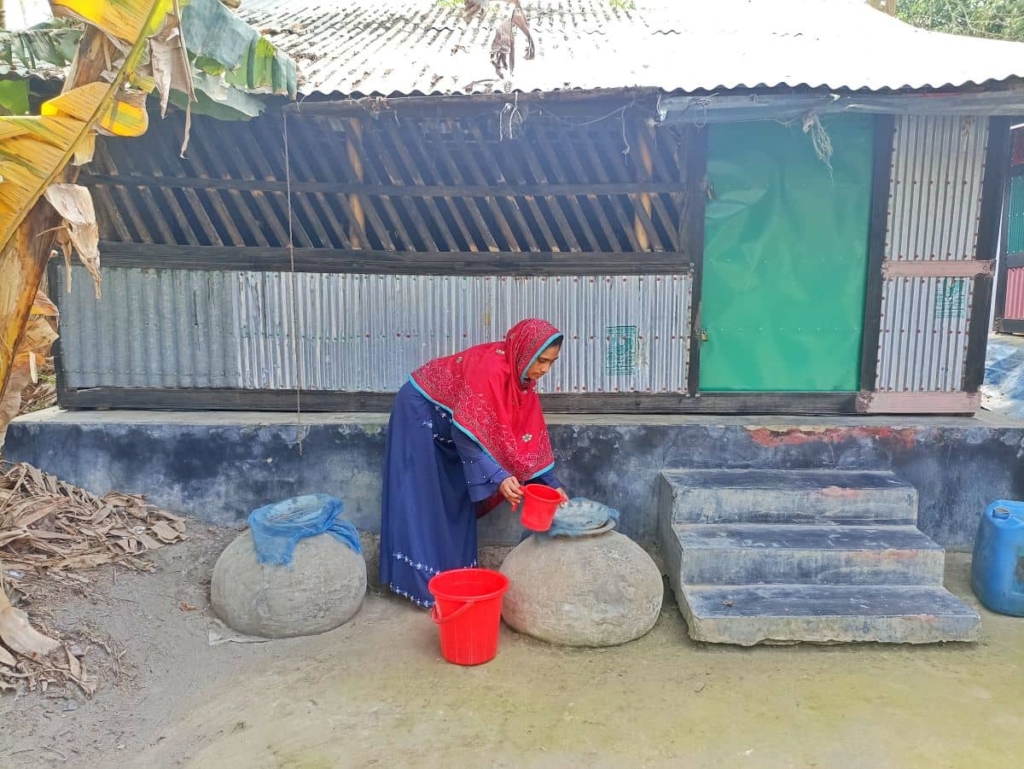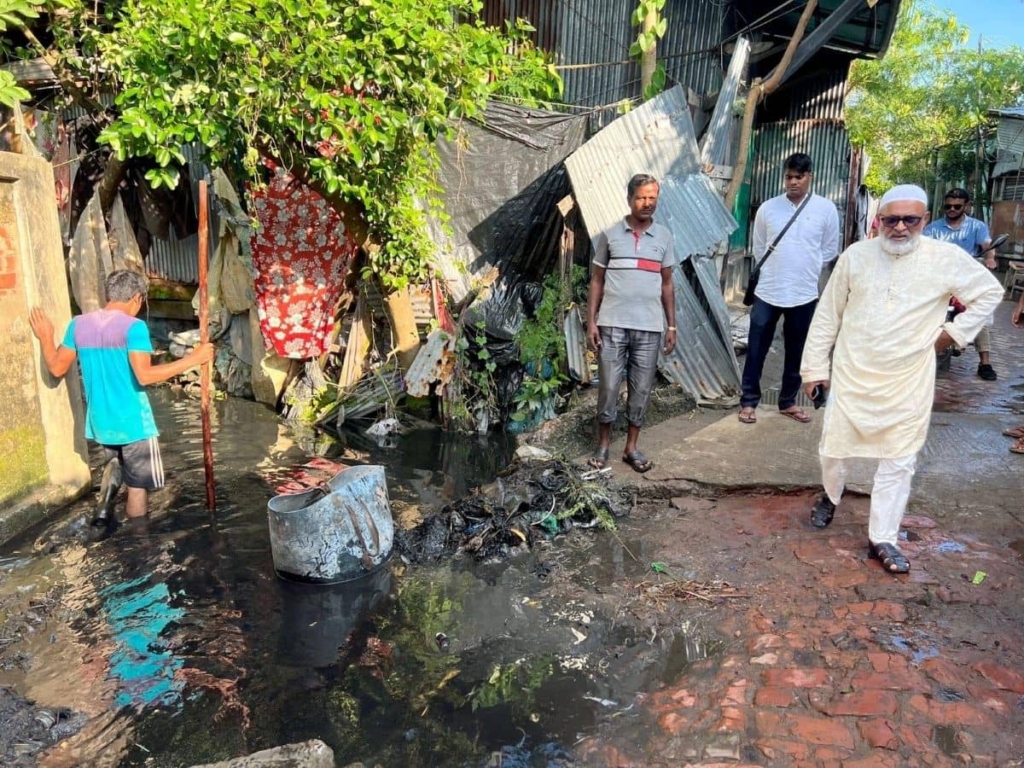In Mongal, Bangladesh the community and the mayor are working together to adapt to climate change. This is the third of the “Voices from the Frontline (Phase III)” stories by GRP and ICCCAD supported by Irish Aid.
Mongla, a small port town situated in the southwestern part of Bangladesh, has been grappling with the impacts of climate change for years. The town is home to people who rely heavily on fishing and agriculture for their livelihoods. However, rising sea levels, frequent floods, and cyclones have made life increasingly difficult for them. The situation is compounded by deforestation and land degradation, resulting in soil erosion and biodiversity loss.
The town’s location on the coast makes it highly vulnerable to the impacts of climate change. Studies show that sea levels in the Bay of Bengal are rising at a rate higher than the global average, putting Mongla and other coastal areas at risk of inundation. Over the years, Mongla has experienced rapid onsets like devastating floods, cyclones, and storm surges, leading to loss of lives and property. While the economic losses and damages are visible, the non-economic aspects of those impacts, like deteriorating health, sexual violence, and physical, mental, and emotional distress, etc. are often overlooked and much less talked about.
Declining fish stocks
In Mongla, Mr. Benzir Khan, a fisherman, has reported a decline in fish stocks due to changes in water temperature and salinity levels. This has reduced his income and increased food insecurity for him and many other fishermen and their families. “I lost everything. My only source of income was fishing for 22 years. I had two trawlers and 18 employees. Now I have nothing,” said Benzir Khan.
Last year, he took a loan of almost $23,000 USD to invest in his fishing business. However, due to climate change, fish have been scarce at the regular hotspots in the Sundarbans. As a result, he was unable to pay the loans. Ultimately, he had to sell his trawlers to pay off the loans and eventually couldn’t go fishing this year.
Health effects
Slow onsets like salinity intrusion limit access to freshwater and have multiple health impacts like diarrhea and skin diseases. In addition, women claim the lack of fresh water effects their reproductive organs. Hina Begum and Halima Begum, housewives living in Mongla, talked about how almost every woman in their village suffers from reproductive health issues. They also spoke about how young women risk facing sexual harassment on their way to collect water.
Despite challenges, the community perseveres
Despite these challenges, the people of Mongla have shown remarkable resilience in adapting to the changing climate. The government has initiated several projects to help the town adapt, including constructing cyclone shelters and embankments to protect against floods. They also practice rainwater harvesting during the rainy season.
To learn about the initiatives taken to tackle the loss and damage caused by climate change, we met Sheikh Abdur Rahman, Mongla’s mayor since 2021, who has been a rock for the community. He has been working on combating climate change and its impacts. In his leadership, the town of Mongla has made itself more flood-resistant by constructing an 11 kilometer (7 mile) long marine drive road, two flood-control gates, an improved drainage system, a water reservoir, and a water treatment facility.
Upon asking how climate change has affected Mongla, Mr. Sheikh Abdur Rahman said, “Many people have migrated here. We are struggling to cope with this influx of migrants. Mongla Municipality is now in a difficult situation. We cannot provide drinking water to these people because the rivers contain saline water. The water reserve tanks that we have last for only 5 months. After that, we have to depend on rain. But due to climate change and erratic weather patterns, it doesn’t even rain properly during the rainy season. So we try to provide water to the people by bringing mobile water treatment plants from the Department of Public Health Engineering. Despite this, we face water scarcity because it does not pump enough water.”

Mongla, a model of successful adaptability
Even though Mongla is struggling to provide potable water to its people, it is still a model of successful adaptability. “We have two water reservoirs where the reserve is much less than the demand because there are times when there is no water in the ponds during dry seasons. So, in those areas, we provide mobile water treatment plants and provide them with water in the morning and evening”, said Mayor Sheikh Abdur Rahman. There is a big pond full of water hyacinth in this upazila, which is under port authority. The mayor had asked them to give him authority over this pond, which they didn’t agree to. But they agreed to make a 25 foot walkway around the pond, clear the water hyacinths, and make it deeper to create a reserve for water with the funding of the City Region Development Project. As the pond is abandoned, the port authority has permitted them to do this. If they can utilize this pond, hopefully, they can reduce the problem regarding water for migrant people.
Under this project, there will be two new submersible pumps, two laboratories for water treatment plants, a new pond, and a 60-kilometer pipeline. He hopes that if this project gets implemented, most of the water issues will be solved.
Over the years, Mongla has experienced devastating floods, cyclones, and storm surges. Many people have lost their homes, livelihoods, and loved ones and lives. But in recent years, Mongla has been successful in many ways in tackling the economic losses. In the recent cyclone Sitrang, there was not a single casualty.
“In the time Sitrang, we, along with our honorable counselor and workers, worked 24 hours daily. We spent two days in our office. We turned the school, colleges, and madrasas into cyclone centers and managed around 19 cyclone centers so people could feel safe during the cyclone,” said Mayor Rahman. “We have managed dry foods, matches, candles, etc., stored and provided to the people. To make khichdi, we stored rice and lentils. The moment we saw the signals rising alarmingly, we took no risks and ensured everyone was in the cyclone center.”

Collaborating for a way forward
In the recent years, Mongla has shown great resilience in the face of climate change. Despite its difficulties, it has managed to develop and adapt strategies to reduce the damage done by floods, cyclones, and storm surges. The city’s most important step forward is its collaboration between the mayor and citizens to ensure everyone’s safety in times of extreme weather conditions. Although water scarcity continues to be an issue for Mongla, the mayor’s plans to develop new submersible pumps and water treatment plants will hopefully help alleviate this problem in the future.
Interviewer’s perspective:
The people of Mongla have shown how to stay resilient in the face of adversity again and again. Their perseverance under the leadership of Mayor Rahman is exemplary. The mayor has been working with international organizations and NGOs to secure climate change adaptation projects funding. He has also established partnerships with research institutions to gather data on climate change impacts and develop evidence-based policies.
Despite these efforts, much work still needs to be done. The mayor has acknowledged that the town’s resources are limited and that more funding and support from higher levels of government and international organizations are needed to fully address the impacts of climate change in Mongla. For Mongla to reach true resilience, the adaptation technics should be more human-centric, gender-sensitive, and a good blend of top-down and bottom-up approaches.
About the interviewer
Elmee Tabassum is working as a Research Assistant at Center for Participatory Research and Development–CPRD. She has completed her graduation from North South University in Environmental Science and Management. She has previously worked with ICCCAD as a Freelance Research Associate.
About the interviewee:
Mayor Sheikh Abdur Rahman is a well-known figure in Mongla. He was elected as the mayor of the city for two consecutive terms and has been in office since 2021. Throughout his tenure, the mayor has strived to empower the citizens of Mongla, particularly vulnerable communities, to build resilience against climate change. He has taken proactive steps in developing strategies to tackle economic losses due to extreme weather conditions and has been successful in significantly reducing the damage done by floods, cyclones, and storm surges. He is currently working with international organizations and NGOs to secure funding for adaptation projects that will help Mongla become more resilient against climate change.





